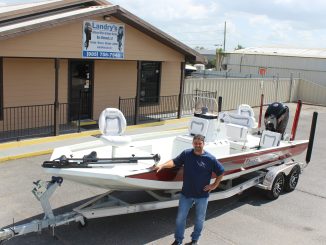
Though a bounty of riches exist in the parish, the economy is hurting the area’s commercial fishermen
It’s been a slow year for commercial fishermen on the bayous of St. Charles Parish, and the escalating fuel costs and downtrodden economy aren’t helping.
“We’re in a slow season right now,” Fisherman Randall Rome said. “But we’re just like everyone else. We’re going through the same economic difficulties due to the rise in gas prices.”
Not only has the price of fuel made boating more difficult, but even the cost of bait has increased.
“Normally, bait would be about $8, but now I’m paying as much as $13 for one box,” Tom Candies, a fellow fisherman, said. “I can spend $130 on just bait alone. I’ve been a commercial fisherman all of my life and, yes we’re slow right now, but you can’t just make money off of one kind of catch.”
Candies says in order to make a living off of being a commercial fisherman, he has to be able to modify his catch by going after what’s in season.
“Right now, I’ve been doing a lot crabbing, but I also catch alligators and catfish,” he said. “You know you got to catch and sell whatever is out there. I’ve also caught and sold a lot of garfish. Just the other day I caught one that weighed 190 pounds.”
But the waterways can be tricky and not all of the days end successfully.
“You can’t spend all of your money that you’ve earned,” Candies said. “Some days you might have a big catch, other days it might be slow, so you’ve always got to put some money on the side just in case.”
Candies’ day starts at 4 a.m. every morning and usually doesn’t end until the sun goes down.
“I recently took my little nephew fishing with me,” he said. “He’s 13 years old, and after a little while of being out on the water, he started saying he was tired and was ready to go home.”
Candies says being tired is a luxury that a fisherman can’t afford.
“You have to keep going,” he said. “At the end of the day, you spend the rest of the evening preparing traps and bait for the next day.”
Candies’ dad is a retired game warden with the Louisiana Wildlife and Fisheries Department and he taught his younger son everything he knows about the business.
“One thing my father did stress to me is the importance of getting an education,” Candies said. “I will tell this advice to my nephew or anybody who is interested in commercial fishing. Finish school and go get a job making over $100,000 where you can sit behind a desk in an air-conditioned building, because this type of work isn’t easy.”
Candies says he has seen many people come and go in the business over the years. Some fished for recreation and even tried to give up their permanent jobs to make a living on the water.
“I know someone who worked at one of the plants and he got tired of that and decided to try fishing for a living,” he said. “He purchased all of his equipment and then he realized he wasn’t making as much money as he thought he was going to. He decided to give it up and go back to working at the plants.”
Candies says success as a commercial fisherman depends on a few important factors. Not only does a person have to have a knowledge of the waterways they’re fishing on, but they also need to know how to manage the money they make.
“I normally run two boats,” he said. “In the past, I’ve paid my fishermen $140 per day for three days to help me with my catch, so I don’t want people to think that there’s no money in it, because there is.”
Rome says some people might make up to $100,000 a year, but that total is greatly reduced when you deduct expenses.
“A commercial fisherman can make, on the average in gross earnings, between $75,000 to $100,000 every year,” Rome said. “But once you deduct the expenses, you usually wind up with about a $30,000 net income.”
Rome says that’s not a bad income considering it’s about the same starting salary for a laborer or a construction worker.
“I didn’t finish high school and I’m able to make a decent living, but it’s hard work and this is the lifestyle I’ve always known,” Rome said. “My father has been a commercial fisherman for over 50 years, and he’s also managed to survive out here on the water. He didn’t finish school and he doesn’t know anything else but life on the bayou.”




Be the first to comment